Posted on March 30, 2011 by The Orwell Prize -

I’m Paul Mason, Newsnight’s economics editor, a job that takes me from Kenyan shanty towns to Russian hedge funds and Chinese factories. My blog is called Idle Scrawl. It veers wildly across the subject: from house prices, to global poverty; from deconstructing glib terminology to devastating critiques of the England football management. It is occasionally meant to be funny.
Submitted blogposts
Other links
Posted on March 30, 2011 by The Orwell Prize -

Married to Max and mother of two teenage children, Molly Bennett works for a Labour MP and “celebrated” a significant birthday just days after the Party lost the General Election. According to Bridget Jones, Molly is a Smug Married – so why doesn’t she feel smug? Is she suffering from a Mid-Wife crisis, or has working for New Labour just taken its toll? Molly’s story begins in early May…..but where will this year take her?
Submitted blogposts
Other links
Posted on March 30, 2011 by The Orwell Prize -

Submitted articles published by The Guardian, The Observer and Granta. Declan Walsh is The Guardian’s foreign correspondent for Pakistan and Afghanistan.
Submitted articles
Other links
Posted on March 30, 2011 by The Orwell Prize -
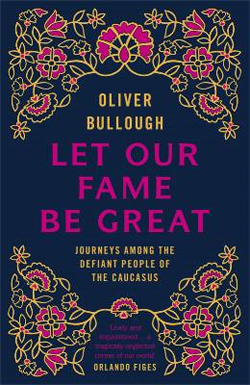
The Caucasus mountains form Russia’s southern border and run from the Crimea to the Caspian Sea. Their jagged white peaks inspired Pushkin and Lermontov, overshadowed decades of guerrilla warfare and were explored by 19th century British mountaineers, but the region is better known to us now (if it is at all) for the struggle in Chechnya and the 2008 summer war between Georgia and Russia over South Ossetia. In Let Our Fame Be Great Oliver Bullough takes the reader through Eastern Europe, Central Asia, Turkey and the Middle East, tracking down the nations dispersed by the brutal wars Russia fought to add these mountains to its empire. Then he journeys through the North Caucasus itself, telling the stories of the land and its peoples. Many of the events he uncovers have never been described in English, while some have never been written about in any language. Let Our Fame Be Great recounts the struggle and survival of peoples who have been mostly forgotten for two hundred years. Their fame is not great, but truly it deserves to be.
Posted on March 30, 2011 by The Orwell Prize -

Rachel Shabi was born in Israel to Iraqi Jews and grew up in England. A journalist, she has written for a variety of national and international newspapers such as The Guardian, the Sunday Times, the New Statesman, the Independent on Sunday, Al-Jazeera English online, the National, Jane’s and Salon.com. For the past five years she has been based in Israel and reporting on the Middle East conflict. Her book, Not the Enemy: Israel’s Jews from Arab Lands, was published by Yale University Press in 2009.
Submitted articles
Other links
Posted on March 30, 2011 by The Orwell Prize -

Leningrad, 1952. Andrei, a young hospital doctor, and Anna, a nursery school teacher, are forging a life together in the postwar, postsiege wreckage. But their happiness is precarious, like that of millions of Russians who must avoid the claws of Stalin’s merciless Ministry of State Security. So when Andrei is asked to treat the seriously ill child of a senior secret police officer, he and Anna are fearful. Trapped in an impossible, maybe unwinnable game, can they avoid the whispers and watchful eyes of those who will say or do anything to save themselves? The Betrayal is a powerful and touching novel of ordinary people in the grip of a terrible and sinister regime, and a moving portrait of a love that will not be extinguished.
Posted on October 19, 2010 by The Orwell Prize -

You’re twelve years old. Your mother’s a junkie and your father might as well be dead. You can’t read or write, and you don’t go to school. An average day means sitting round a bonfire with your mates smoking drugs, or stealing cars. Welcome to Urban’s world. Bernard Hare was on society’s margins, living on one of Leeds’ roughest estates and with a liking for drink and drugs. So he knew what life in the underclass was like in ’90s Britain. But even he was shocked when he met Urban, an illiterate, glue-sniffing twelve-year-old. And through Urban he got to know the Shed Crew – an anarchic gang of kids between the ages of ten and fourteen; joy-riding, thieving runaways, who were no strangers to drugs or sex. Nearly all had been in care, but few adults really cared. Bernard decided to do what he could. He didn’t know what he was letting himself in for.
Posted on October 19, 2010 by The Orwell Prize -

‘Where are you from?’ ‘No, where are you really from?’ These questions, which he has been asked since boyhood, drive Ekow Eshun to travel through Ghana in search of his roots, and lead him on an exploration of history and belonging, from slavery in Africa and the West to the present day and what it means to be black. In search of answers, Ekow unearths yet more questions, some shocking contradictions and some long-forgotten truths about his family past…
Posted on October 19, 2010 by Eric Blair -
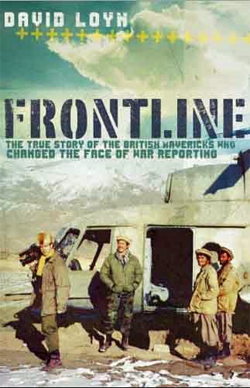
Rory Peck, Peter Jouvenal, Vaughan Smith, and Nicholas Della Casa were the founder members of an exclusive and dangerous club: the Frontline TV News Agency. Between them, this colourful collection of adventurers and ex-army officers captured some of the key images at the end of the Cold War, and the fractured, fissile world which emerged. Two of them are now dead: killed in action. The way they lived and died was an anachronism; they were eccentrics who might have been happier fighting wars in the British Empire a century before. Instead, they brought back pictures from the worst war zones the late twentieth century had to offer. And it suited them. For the men of Frontline, how things were done was as important as what was done. All four of the founders, and those they recruited, shared the same panache, wit, and disdain for authority, planning the next trip to the Hindu Kush in the bar of the Ritz. Their story reads like a latter-day Rudyard Kipling adventure. But while their lives may have been lived as if they were still playing the Great Game, they also cared passionately about their work and the truth it conveyed. Part Bang Bang Club, part Flashman, Frontline is the gripping story of lives lived to the full in some of the worst places on earth.
Posted on October 19, 2010 by The Orwell Prize -

By September 2003, six months after the US-led invasion of Iraq, the anarchy had begun. Rory Stewart, a young Biritish diplomat, was appointed as the Coalition Provisional Authority’s deputy governor of a province of 850,000 people in the southern marshland region. There, he and his colleagues confronted gangsters, Iranian-linked politicians, tribal vendettas and a full Islamist insurgency. Rory Stewart’s inside account of the attempt to re-build a nation, the errors made, the misunderstandings and insumountable difficulties encountered, reveals an Iraq hidden from most foreign journalists and soldiers. Stewart is an award-winning writer, gifted with extraordinary insight into the comedy, occasional heroism and moral risks of foreign occupation. The judges said:
A buccaneering and brilliant evocation of life in Iraq. Not the usual bewailing something, far more revealing for an insider to attempt. A book from the heart of the war – not just an observer’s book but with a confident, witty, intellectual mastery. A tremendous read.
Posted on October 19, 2010 by The Orwell Prize -

In 1991 journalists on broadsheet newspapers began to publish stories claiming that Bryn Estyn, a home for adolescent boys on the outskirts of Wrexham, lay at the centre of a network of evil – a paedophile ring whose members included a senior North Wales police officer. A massive investigation was launched which, over the next ten years, spread to care homes throughout Britain. Thousands were accused, hundreds arrested, and the prisons began to fill up with convicted care workers. Had we at last faced up to a horrifying reality? Or was there another, even more disturbing story that remained to be uncovered? Had leading journalists on quality newspapers themselves helped to set in motion a new kind of witch hunt, one that was unable to distinguish between the guilty and the innocent?
Posted on October 19, 2010 by The Orwell Prize -

In this irreverent and provocative book, Lewis Page exposes the scandalous state of our armed forces: how British soldiers are sent off to war with some of the worst guns around, how the MOD keeps financing useless toys (at huge expense to taxpayers), and how decisions seem to be made with an eye, above all, for the interests of British Aerospace. He shows how politicians and the top brass are hopelessly entrenched in yesterday’s wars and pouring their talents and energies into making sure that money is wasted right, left and centre. The judges said:
Both very funny and very appalling – a Catch 22 or Evelyn Waugh account of how the whole system of supply and contract has most importantly let the British Army down. An absurd story written again by an insider with an unparalleled grasp of the lunacies of the situation. An indictment of a process and an almost surreal sense of blunder built on incompetence built on ridiculousness.
Posted on October 19, 2010 by The Orwell Prize -

One small East African country embodies the battered history of the continent: patronised by colonialists, riven by civil war, confused by Cold War manoeuvring, proud, colorful, with Africa’s best espresso and worst rail service. Michela Wrong brilliantly reveals the contradictions and comedy, past and present, of Eritrea. Just as the beat of a butterfly’s wings is said to cause hurricanes on the other side of the world, so the affairs of tiny Eritrea reverberate onto the agenda of superpower strategists. This new book on Africa is from the author of the critically acclaimed In the Footsteps of Mr Kurtz. Eritrea is a little-known country scarred by decades of conflict and occupation. It has weathered the world’s longest-running guerrilla war, and the dogged determination that secured victory against Ethiopia, its giant neighbour, is woven into the national psyche. Fascist Italy wanted Eritrea as the springboard for a new, racially-pure Roman empire, Britain sold off its industry for scrap, the US needed headquarters for its state-of-the-art spy station and the Soviet Union used it as a pawn in a proxy war. Michela Wrong reveals the breathtaking abuses this tiny nation has suffered and, with the sharp eye for detail that was the hallmark of her account of Mobutu’s Congo, she tells the story of colonialism itself. Along the way, we meet a formidable Emperor, a guerrilla fighter who taught himself French cuisine in the bush, and a chemist who arranged the heist of his own laboratory. An arresting blend of travelogue and history, I Didn’t Do It For You pierces the dark heart of our colonial history.
- Michela Wrong, Lord Ashdown, Peter Beaumont and David Loyn, ‘Is journalism failing failing states?’, Orwell Prize Launch Debate 2009
- Michela Wrong on Journalisted
Posted on October 19, 2010 by The Orwell Prize -
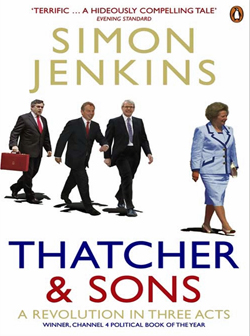
The history of Britain in the last thirty years, under both Conservative and Labour governments, has been dominated by one figure – Margaret Thatcher. Her election marked a decisive break with the past and her premiership transformed not just her country, but the nature of democratic leadership. Simon Jenkins analyses this revolution from its beginnings in the turmoil of the 1970s through the social and economic changes of the 1980s. Was Thatcherism a mere medicine for an ailing economy or a complete political philosophy? And did it eventually fall victim to the dogmatism and control which made it possible? This is the story of the events, personalities, defeats and victories which will be familiar to all those who lived through them, but seen through a new lens. It is also an argument about how Thatcher’s legacy has continued down to the present. Not just John Major, but Tony Blair and Gordon Brown are her heirs and acolytes. And as the Conservative party reinvents itself as a viable political force once again, is the age of Thatcher finally over? The judges said:
One of the most elegant, balanced, wise accounts of where our politics has arrived at and come from. Written with great brio and accomplishment but based on such a deep understanding of the forces in Conservative and Labour politics that have forged contemporary Britain – and the terrible errors the heredity has left us open to.
Posted on October 19, 2010 by The Orwell Prize -

Bad Faith tells the story of one of history’s most despicable villains and conmen – Louis Darquier, Nazi collaborator and ‘Commissioner for Jewish Affairs’, who dissembled his way to power in the Vichy government’s and was responsible for sending thousands of children to the gas chambers. After the war he left France, never to be brought to justice. Early on in his career Louis married the alcoholic Myrtle Jones from Tasmania, equally practised in the arts of fantasy and deception, and together they had a child, Anne whom they abandoned in England. Her tragic story is woven through the narrative. In Carmen Callil’s masterful, elegaic and sometimes darkly comic account, Darquier’s rise during the years leading up to the Second World War mirrors the rise of French anti-Semitism. Epic, haunting, the product of extraordinary research, this is a study in powerlessness, hatred and the role of remembrance. The judges said:
A painful, painstaking account of terrible people, doing terrible things. But all the more stilling because they were small terrible people – with a both redemptive and a desperate aftermath in the daughter who was a good but damaged person. A very steady measured account, beautifully crafted.
Posted on October 19, 2010 by The Orwell Prize -
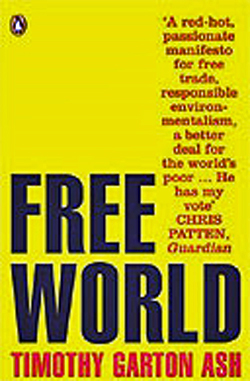
At the start of the 21st century, the world plunged into crisis. What began as an attack on the West by Osama bin Laden soon became a dramatic confrontation between Europe and America. Britain has found itself painfully split, because it stands with one foot across the Atlantic and the other across the Channel. The English, in particular, are hopelessly divided between a Right that argues our place is with America, not Europe, and a Left that claims the opposite. This is today’s English civil war. Both sides tell us we must choose. In this powerful new work Timothy Garton Ash, one of our leading political writers, explains why we cannot, need not and must not choose between Europe and America.
Posted on October 19, 2010 by The Orwell Prize -
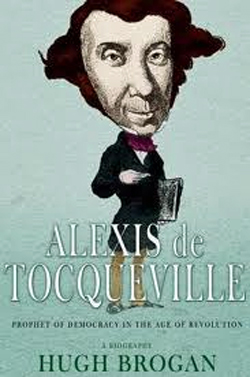
It is now 200 years since the birth of Alexis de Tocqueville, French aristocrat, liberal politician and writer of genius whose great works, Democracy in America and the Ancien Regime, are ever more influential and discussed. As the son of a noble family which was nearly wiped out in the Revolution and as an ambitious politician during the July Monarchy and the Second Republic, he had a front seat at the revolutionary drama of his time. His writings are hugely valuable for the study of French, British and American society during his life (he visited the US in 1831 to gather material). It is Brogan’s long held ambition to write this biography. No one has yet attempted a biography of de Tocqueville in the English tradition and for that reason he is not fully present to the public imagination rather than an intellectual monument. This superb work will put that right. The judges said:
A touching vivid portrait of the thought and times and life of one of the most important thinkers about America, whose work is still some of the most powerful and still relevant. A book that really explores the thought in the context of the life – and a careful portrait of de Tocqueville’s important and difficult marriage – a stunner.
Posted on October 18, 2010 by The Orwell Prize -

I’m Paul Mason, Newsnight’s economics editor, a job that takes me from Kenyan shanty towns to Russian hedge funds and Chinese factories. My blog is called Idle Scrawl. It veers wildly across the subject: from house prices, to global poverty; from deconstructing glib terminology to devastating critiques of the England football management. It is occasionally meant to be funny.
Submitted blogposts
Other links
I’m Paul Mason, Newsnight’s economics editor, a job that takes me from Kenyan shanty towns to Russian hedge funds and Chinese factories. My blog is called Idle Scrawl. It veers wildly across the subject: from house prices, to global poverty; from deconstructing glib terminology to devastating critiques of the England football management. It is occasionally meant to be funny.
















